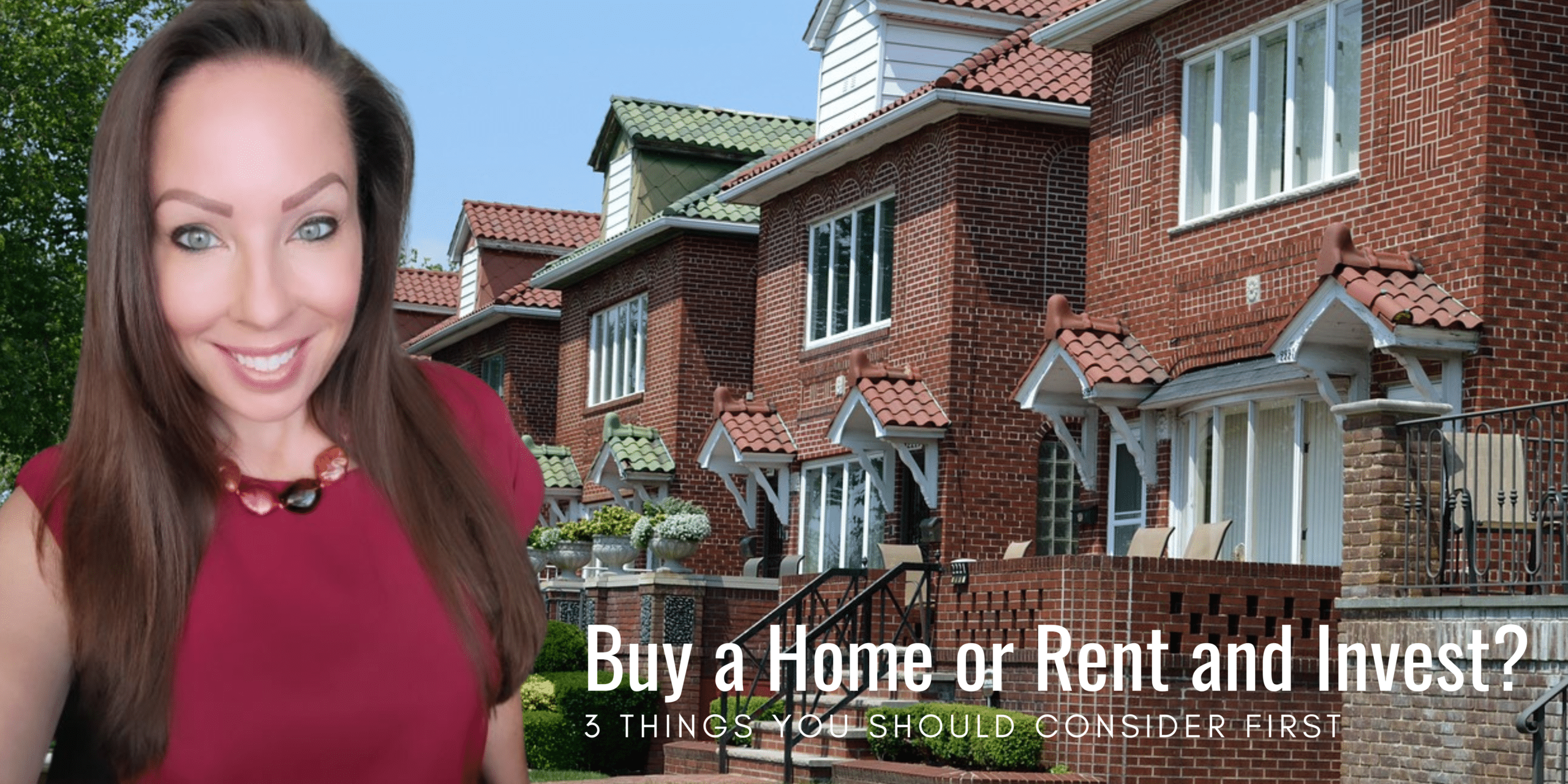
Buy a home or rent and invest? If you’ve been thinking about getting into the real estate market, this could be a question that’s been on your mind.
The answer to the question at hand is primarily dependent on your personal circumstances. More often than not, the decision to move can be based on a number of factors such as finances, lifestyle and location. The weight that you put on each of these areas, and if you should buy a home or rent and invest, can vary based on your preference and personal needs.
If you’ve been debating whether or not to buy a home or rent and invest, here are some of the important considerations you should keep in mind as you navigate the pro’s and con’s.
First things first! If you’re looking at if you should buy a home or rent and invest, you should consider your TIME HORIZON.
As you plan your move (pun intended ??), it’s crucial that you ask yourself – “how long am I planning to live in my new home?”
How long you plan to live in the property you purchase is a big factor to help decide if you should buy a home or rent and invest.
The rule of thumb when it comes to this is the longer you plan to live there, then the more favourable the decision to buy becomes. As I’m sure you can appreciate, real estate can be a long-term investment and there are finite costs associated with buying and then later on, selling a property. If you’re only planning to live somewhere in the short term, you may consider this differently.
We are fortunate to live here in Canada, where real estate, as a whole, has appreciated positively over the past decade (if not longer). This said, thousands of dollars in transaction related costs from land transfer taxes and moving costs to real estate and legal fees can eat into this appreciation.
Depending on how these costs impact your property, you simply may not be able to justify a financial investment of this magnitude in the short term. Even with positive market conditions, it’s important to take a hard look at these numbers to protect yourself and your investment.
Now, should you plan to live in the same place for less than three years, then you could be better off renting to avoid making a speculative investment. If you are looking at five years or more, then buying could turn out to be the better option.
There is an old saying, “the best time to invest in real estate is yesterday; the next best time is today” does ring true in most cases, but like anything, it really depends on the situation.
Even if you plan to move in a short period of time, for example, but you buy a property you can make significant improvements to, since a primary residence is sheltered from capital gains taxes, then you can stand to cash in on both active and passive appreciation.
For a lot of people, trying to see that far into their future can be challenging. There are many things that can impact your future such as employment, relationships, losses etc. The present you are experiencing now that can dictate your decision to buy a home or rent and invest can change dramatically under any of these circumstances.
Nobody has a crystal ball so your decision should truly be drive by your lifestyle needs, today, and into the future you can foresee for yourself. For example, if you’d like to start a family, can the home you’re looking at accommodate more family members comfortably? Is this home in an area with good schools, parks and amenities. In addition, will the length of your commute from this location eat away at the family time you need?
All of these are very important questions to ask yourself before moving ahead.
Ultimately, the goal is to choose a home in a location that accounts for as many of these elements as possible. You should be trying to limit the number of times you need to move and in turn, minimize the financial implications associated so you can maximize your long-term investment returns – should you opt to buy.
Next, be sure to take a close look at your FINANCES.
In addition to saving up for a down payment, you also need to consider a couple of other aspects – the monthly carrying costs of owning a home; and down the road, what costs would be associated with selling the property later on.
Although you may be used to paying rent, you may not have a clear understanding of all of the expenses associated with owning a home.
If you’re thinking about if you should buy a home or rent and invest, then you really need to understand the whole picture explicitly.
Here is a general breakdown:
- Mortgage payments (and if they are subject to fluctuate with interest rates)
- Utilities including gas to heat the home, electricity to power the home along with water
- Home insurance to protect your investment
- Property taxes (note these can vary significantly from municipality to municipality. Durham region has high taxes compared to Toronto for example)
- Maintenance fees (should they be applicable)
If you’ve been renting but you want to jump into home ownership, you could be looking at an increased expenditure hitting your bottom line and ultimately your disposable income. The last thing you want is to be “house poor” or struggling to keep up with payments so taking a realistic look at your finances is important.
Along with these expenses, you should also account for unexpected increases in the cost of fuel (which has been at an all time high), groceries (also going up due to the high gas prices) and what would happen in the unforeseen situation you lost your source of employment.
Interest rates have been historically low for the past 15 years but real estate has been breaking records for all time highs. As I’m sure you’re aware, the Bank of Canada has been raising rates to try to curb inflation and bring housing prices down.
You could be fearful of where the interest rates are headed, but if they go up 25-30% and housing prices go down by 25-30%, it could all be a wash. If I were you, I wouldn’t make my decision to buy a home or invest and rent solely based on where interest rates could be headed.
Last but not least, let’s take a look at LOCATION.
Depending on your personal goals and objectives, there could be some situations where it makes more sense to continue to rent rather than buy a home. If you want to live in the downtown core of Toronto, for example, this could be one of those cases.
Let’s say you are looking at purchasing a condo in a high rise building. You could potentially rent a one bedroom condo in a prime location for in and around $2,000/mth. To buy in the same area, could run you around $600,000+/-.
In a situation such as this, for someone who wants to live here in the short term, renting is likely a better idea, especially if you can only make the minimum down payment.
As we head east or west outside of the city, you can rent a two-bedroom unit with parking for around $2,500/mth. To buy, you’d be looking at $450,000-$500,000+/-. If you have managed to save up a sizeable down payment, then purchasing the property could be a better investment given the monthly carrying costs could be comparable – and you’d be building up equity during the timeframe that you live there.
Of course, there could be units that sell for higher than list price but this is still a purposeful exercise to help you, as a prospective buyer, to try to research and understand what carrying costs could look like in different parts of the GTA.
Evaluating the monthly carrying costs is a great way to help you decide if you should buy a home or rent and invest.
If you’re looking at single family homes over condos, another consideration would be if a property has income property potential. Even if you have to spend $20,000-$30,000 to turn a basement into a legal apartment, if you can offset a sizable chunk of your monthly expenses, it could be well worth it. It will also help improve the resale value of the home later on, if/when you choose to sell.
Of course, if a property already comes with a legal suite, then you’re likely paying for this in the purchase price. If not but it can be done, then you’re looking at investing time and money to make this happen. Depending on the size of your down payment, this may or may not be a realistic goal.
Bottom Line?
If you buy a property, what you’d be spending on rent is a like a forced savings plan that helps you grow your net worth long-term. If you have a good amount set aside as your down payment, then you could be saving money monthly compared to rent, where you’re paying off someone’s mortgage for them.
Again, consider your timeframe to live there, your finances and the location. All of this and more will weigh heavily on whether you should buy a home or rent and invest.
There is no magic “one size fits all” answer since real estate is extremely personal and objective to each individual. What works for you and your situation may not work for someone else and their respective circumstances.
There are benefits to buying as well as renting. Ultimately, this choice needs to be evaluated very carefully. A little bit of effort and due diligence will help you, as a prospective home owner, gain clarification to help prepare you for your next move.
If you are thinking about making a move, I’d love to help you weigh your options. Let’s talk! I can be reached at 647.896.6584, by email at info@serenaholmesrealtor.com or complete this simple contact form.
For lots of other great tips, let’s connect on social and subscribe to my YouTube channel.











